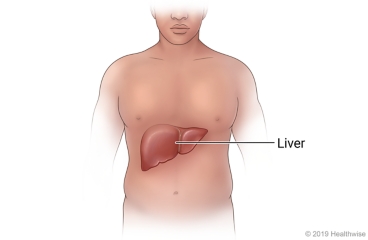
What is it?
Acute liver failure is sudden damage to the liver that keeps it from working as it should and may be life-threatening. The illness may develop in days to weeks. How long it takes depends on its cause.
A healthy liver removes toxins from the blood. It makes substances that help blood clot. It also helps your body use nutrients from the food you eat.
A damaged liver allows toxins to build up in your blood. The toxins may cause confusion, slurred speech, and tremors. This is called hepatic encephalopathy (say "hip-PAT-ik in-sef-uh-LAW-puh-thee"). Your liver may also stop making blood clotting factors and certain proteins in your blood. This can lead to serious bleeding and a buildup of fluids in the belly (ascites) and legs.
What causes it?
The most common causes of acute liver failure are:
- Taking too much acetaminophen (Tylenol).
- Many over-the-counter medicines contain acetaminophen. It's easy to accidentally take more than one of these medicines together when you have a cold or a headache. Or you may take too much acetaminophen when the regular dose doesn't seem to work.
- Viral hepatitis.
- Hepatitis is a virus that can damage the liver.
Other causes of acute liver failure include:
- Alcoholic liver disease.
- Blood diseases or problems with blood flow to the liver.
- Reactions to medicines such as antibiotics and NSAIDs.
- Wilson's disease.
- Some herbal medicines and dietary supplements.
- Poisoning from eating certain mushrooms.
What are the symptoms?
Symptoms of acute liver failure may include:
- Yellow color of the skin and the white part of the eyes. (This is called jaundice).
- Nausea and vomiting.
- Pain in the upper right belly.
- Feeling tired.
- Loss of appetite.
- Itching.
- Fever.
- Dark-colored stools.
- Fluid buildup in the belly, legs, and arms.
- Easy bruising.
- Changes in behavior, confusion, slurred speech, and hand tremors.
Symptoms can suddenly become severe and life-threatening.
How is it diagnosed?
Your doctor will ask about your past health and do a physical exam. You will be checked for jaundice and for swelling and pain in your liver, among other things. You will have blood tests to see how well your liver is working.
Blood tests measure levels of certain substances made by your liver. These include blood-clotting factors and proteins. Your doctor may also test for acetaminophen in your blood.
If the results aren't clear, you may have other tests. These include imaging tests such as ultrasound, CT scans, and MRI scans of your belly. These scans can check for different causes of liver failure, like tumors and blocked bile ducts.
How is it treated?
The main treatment for acute liver failure is supportive care. This includes managing your body's fluids and controlling your bleeding risk. Treatment usually happens in the hospital. Severe cases may be treated in the intensive care unit.
The treatment you get will depend on what caused your liver failure. If you took too much acetaminophen, you may get medicines to stop its side effects. Fluid buildup in your body may be treated with diuretics. If the fluid is collecting in your belly, your doctor may drain it with a needle or a flexible tube.
A liver transplant may be an option for some people with severe liver failure. During a transplant, a doctor removes the damaged liver. Then it is replaced with a donor liver or part of one.
Current as of: October 19, 2024
Author: Ignite Healthwise, LLC Staff
Clinical Review Board
All Ignite Healthwise, LLC education is reviewed by a team that includes physicians, nurses, advanced practitioners, registered dieticians, and other healthcare professionals.

